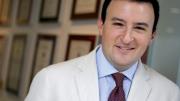“There are people for whom the past is very vivid,” says professor of government Eric Nelson ’99. He is one of them. Stirred by a viewing of The Ten Commandments, he became “maniacally interested in ancient Egypt” as a four-year-old, tried to learn hieroglyphics, and went to the Metropolitan Museum of Art every week. (His own family history includes grandparents who survived the Holocaust.) Later, Nelson added a passion for politics and acquired some languages: he reads Greek, Latin, Hebrew, French, Italian, and German, and speaks French, Italian, and “embarrassingly bad Hebrew.” His passions and skills have fueled a virtuoso academic career as a political theorist: a summa cum laude history degree, a doctorate from Trinity College, Cambridge, a stint as a Junior Fellow, and tenure at the precocious age of 32. His first book, The Greek Tradition in Republican Thought (2004), traces the “impact of the revival of the Greek language in Western Europe on the development of political theory,” he says. The Hebrew Republic (2010) argues that modern political thought grew not from secularization, but from sixteenth- and seventeenth-century encounters of Christian scholars with the Hebrew Bible and related sources; they saw the Bible as a political constitution written by God. Nelson also edited a 2008 edition of Thomas Hobbes’s translations of the Iliad and Odyssey; Hobbes, he says, “rewrote the poems so they would teach Hobbesian political theory.” An avid skier and opera fan, Nelson also collects old books. “There is something about holding a first printing of Leviathan in your hands,” he says. “It does give you a feeling of connectedness.”
Government professor Eric Nelson studies political theory
Government professor Eric Nelson studies political theory
Profile of a Harvard government professor and political theory scholar

You might also like
Eating for the Holidays, the Planet, and Your Heart
“Sustainable eating,” and healthy recipes you can prepare for the holidays.
Five Questions with Michèle Duguay
A Harvard scholar of music theory on how streaming services have changed the experience of music
Harvard Faculty Discuss Tenure Denials
New data show a shift in when, in the process, rejections occur
Most popular
Explore More From Current Issue

Rabbi, Drag Queen, Film Star
Sabbath Queen, a new documentary, follows one man’s quest to make Judaism more expansive.

At Harvard’s Beck-Warren House, Ghosts Speak Many Languages
The quirky 1833 home now hosts Celtic scholars.

The Enterprise Research Campus in Allston Nears Completion
A hotel, restaurants, and other retail establishments are open or on the way.





